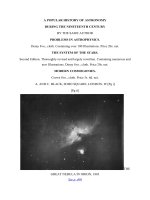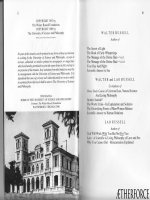- Trang chủ >>
- Khoa Học Tự Nhiên >>
- Vật lý
medieval philosophy a new history of western philosophy volume 2 sep 2005
Bạn đang xem bản rút gọn của tài liệu. Xem và tải ngay bản đầy đủ của tài liệu tại đây (7.88 MB, 353 trang )
Medieval Philosophy
This page intentionally left blank
A NEW HISTORY OF WESTERN PHILOSOPHY
volume 11
Medieval Philosophy
anthony
kenny
CLARENDON PRESS Á OXFORD
3
Great Clarendon Street, Oxford ox26dp
Oxford University Press is a department of the University of Oxford.
It furthers the University’s objective of excellence in research, scholarship,
and education by publishing worldwide in
Oxford New York
Auckland Cape Town Dar es Salaam Hong Kong Karachi Kuala Lumpur
Madrid Melbourne Mexico City Nairobi New Delhi Taipei Toronto
Shanghai
With oYces in
Argentina Austria Brazil Chile Czech Republic France Greece
Guatemala Hungary Italy Japan South Korea Poland Portugal
Singapore Switzerland Thailand Turkey Ukraine Vietnam
Published in the United States
by Oxford University Press Inc., New York
ß Sir Anthony Kenny 2005
The moral rights of the author have been asserted
Database right Oxford University Press (maker)
First published 2005
All rights reserved. No part of this publication may be reproduced,
stored in a retrieval system, or transmitted, in any form or by any means,
without the prior permission in writing of Oxford University Press,
or as expressly permitted by law, or under terms agreed with the appropriate
reprographics rights organization. Enquiries concerning reproduction
outside the scope of the above should be sent to the Rights Department,
Oxford University Press, at the address above
You must not circulate this book in any other binding or cover
and you must impose this same condition on any acquirer
British Library Cataloguing in Publication Data
Data available
Library of Congress Cataloging in Publication Data
Data available
ISBN 0-19-875275-X
13579108642
Typeset by Kolam Information Services Pvt. Ltd, Pondicherry, India
Printed in Great Britain on acid-free paper by
Biddles Ltd., Kings Lynn, Norfolk
SUMMARY OF CONTENTS
List of Contents vii
Map x
Introduction xi
1. Philosophy and Faith: Augustine
to Maimonides
1
2. The Schoolmen: From the Twelfth Century
to the Renaissance
54
3. Logic and Language 115
4. Knowledge 156
5. Physics 176
6. Metaphysics 189
7. Mind and Soul 214
8. Ethics 252
9. God 278
Chronology 313
List of Abbreviations and Conventions 315
Bibliography 319
List of Illustrations 327
Index 330
This page intentionally left blank
CONTENTS
Map x
Introduction xi
1. Philosophy and Faith: Augustine to
Maimonides
1
Augustine on History 4
Augustine’s Two Cities 9
The Consolations of Boethius 16
The Greek Philosophy of Late Antiquity 23
Philosophy in the Carolingian Empire 29
Muslim and Jewish Philosophers 33
Avicenna and his Successors 37
Anselm of Canterbury 40
Abelard 44
Averroes 48
Maimonides 50
2. The Schoolmen: From the Twelfth Century
to the Renaissance
54
Robert Grosseteste and Albert the Great 57
St Bonaventure 60
Thomas Aquinas 63
The Afterlife of Aquinas 74
Siger of Brabant and Roger Bacon 79
Duns Scotus 82
William Ockham 89
The Reception of Ockham 95
The Oxford Calculators 97
John Wyclif 99
Beyond Paris and Oxford 102
Renaissance Platonism 105
Renaissance Aristotel ianism 111
3. Logic and Language 115
Augustine on Language 115
The Logic of Boethius 119
Abelard as Logician 123
The Thirteenth-Century Logic of Terms 127
Propositions and Syllogisms 132
Aquinas on Thought and Language 136
Analogy and Univocity 139
Modistic Logic 142
Ockham’s Mental Language 143
Truth and Inference in Ockham 147
Walter Burley and John Wyclif 150
Three-Valued Logic at Louvain 153
4. Knowledge 156
Augustine on Scepticism, Faith, and Knowledge 156
Augustine on Divine Illumination 159
Bonaventure on Illumination 162
Aquinas on Concept-Formation 163
Aquinas on Faith, Knowledge, and Science 166
The Epistemology of Duns Scotus 171
Intuitive and Abstractive Knowledge in Ockham 173
5. Physics 176
Augustine on Time 176
Philoponus, Critic of Aristotle 179
Natural Philosophy in the Thirteenth Century 180
Actual and Potential InWnity 185
6. Metaphysics 189
Avicenna on Being, Essence, and Existence 189
Aquinas on Actuality and Potentiality 195
The Metaphysics of Duns Scotus 201
Ockham’s Reductive Programme 207
Wyclif and Determinism 211
7. Mind and Soul 214
Augustine on the Inner Life 214
CONTENTS
viii
Augustine on the Will 220
The Agent Intellect in Islamic Thought 223
Avicenna on Intellect and Imagination 225
The Psychology of Averroes 230
Aquinas on the Senses and the Intellect 233
Aquinas on the Will 238
Scotus versus Aquinas 242
Ockham versus Scotus 245
Pomponazzi on the Soul 247
8. Ethics 252
Augustine on How to be Happy 252
Augustine on Lying, Murder, and Sex 255
Abelard’s Ethic of Intention 260
Aquinas’ Ethical System 263
Aquinas as Moralist 267
Scotus on Divine Law 272
The Ethics of Ockham 275
9. God 278
The God of Augustine 278
Boethius on Divine Foreknowledge 283
Negative Theology in Eriugena 285
Islamic Arguments for God’s Existence 288
Anselm’s Proof of God 290
Omnipotence in Damiani and Abelard 295
Grosseteste on Omniscience 298
Aquinas on God’s Eternal Knowledge and Power 299
Aquinas’ Proofs of God’s Existence 302
Duns Scotus’ Metaphysical Proof of an InWnite Being 304
Scotus, Ockham, and Valla on Divine Foreknowledge 307
The Informed Ignorance of Nicholas of Cusa 311
Chronology 313
List of Abbreviations and Conventions 315
Bibliography 319
List of Illustrations 327
Index 330
CONTENTS
ix
Alexandria
Jerusalem
Edessa
Ephesus
Chalcedon
Constantinople
Duns
Oxford
London
Canterbury
Deventer
Louvain
Cologne
Soissons
Aachen
Bec
Paris
Sens
Poitiers
Munich
Constance
Basel
Lyons
Avignon
Milan
Padua
Ravenna
Florence
Rome
Fossanuova
Naples
Cordoba
Marrakesh
Hippo
Carthage
0
500 miles
0 400 800 km
The world of medieval philosophy
INTRODUCTION
M
ost histories of philosophy, in this age of specialization, are the work
of many hands, by specialists work ing in diVerent Welds and periods.
In inviting me to write, single-handed, a history of philosophy from the
earliest times to the present day, Oxford University Press gave expression to
the belief that there is still something to be gained by presenting the
development of philosophy from a single viewpoint, linking ancient,
medieval, early modern, and contemporary philosophy into a single nar-
rative concerned with connected themes. This is the second of four
volumes. The Wrst volume covered the early centuries of philosophy in
classical Greece and Rome. This volume takes up the narrative from the
conversion of St Augustine and continues the story up to the humanist
Renaissance.
There are two quite diVerent reasons why readers may wish to study the
history of philosophy. They may be mainly interested in philosophy, or
they may be mainly interested in history. We may study the great dead
philosophers in order to seek illumination upon themes of present-day
philosophical inquiry. Or we may wish to understand the people and
societies of the past, and read their philosophy to grasp the conceptual
climate in which they thought and acted. We may read the philosophers of
other ages to help to resolve philosophical problems of abiding concern, or
to enter more fully into the intellectual world of a bygone era.
I am by profession a philosopher, not a historian, but I believe that
the history of philosophy is of great importance to the study of philoso-
phy itself. It is an illusion to believe that the current state of philosophy
represents the highest point of philosophical endeavour yet reached. These
volumes are written with the purpose of showing that in many respects the
philosophy of the great dead philosophers has not dated, and that one may
gain philosophical illumination today by a careful reading of the great
works that we have been privileged to inherit.
I attempt in these volumes to be both a philosophical historian and a
historical philosopher. Multi-authored histories are sometimes structured
chronologically and sometimes structured thematically. I try to combine
both approaches, oVering in each volume Wrst a chronological survey, and
then a thematic treatment of particular philosophical topics of abiding
importance. The reader whose primary interest is historical will focus on
the chronological survey, referring where necessary to the thematic
sections for ampliWcation. The reader who is more concerned with the
philosophical issues will concentrate rather on the thematic sections of the
volumes, referring back to the chronological surveys to place particular
issues in context.
The audience at which these volumes are primarily aimed is at the level
of second- or third-year undergraduate study. However, many of those
interested in the history of philosophy are enrolled in courses that are not
primarily philosophical. Accordingly I endeavour not to assume a familiar-
ity with contemporary philosophical techniques or terminology. I aim also
to write in a manner clear and light-hearted enough for the history to be
enjoyed by those who read it not for curricular purposes but for their own
enlightenment and entertainment.
Not so long ago, in many universities, courses in the history of philoso-
phy went straight from Aristotle to Descartes, leaping over late antiquity
and the Middle Ages. There was a widespread belief in academic circles that
medieval philosophy was not worth studying. This belief was not usually
based on any close acquaintance with the relevant texts: it was more likely
to be an unexamined inheritance of religious or humanist prejudice.
There were, however, many genuine obstacles that made medieval
philosophy less accessible than the philosophy of any other age. We may
identify four signiWcant barriers that have to be surmounted if one is to
come to grips with the thought of the philosophers of the Middle Ages: the
linguistic, the professional, the confessional, and the parochial.
Most of the philosophy of the high Middle Ages is written in Latin which
even those well trained in classical Latin Wnd very diYcult to comprehend.
Even Thomas Aquinas presents initial diYculties to a reader brought up on
Livy and Cicero, and Aquinas is a model of simple lucidity by comparison
with most of his colleagues and successors. It is only in recent years that
translations into English of medieval writers have become widely available,
and the task of translation is not a trivial one. Scholastic Latin is full of
technical neologisms which are hard to render into other languages
without cumbrous paraphrase. It is true that many of these neologisms,
transliterated, survive into modern languages, and often into everyday use
INTRODUCTION
xii
(e.g. ‘intelligence’, ‘evidence’, ‘voluntary’, ‘supposition’). But the modern
use is never an exact equivalent of the scholastic use, and often diVers from
it widely. ‘Subjective’ and ‘objective’, for instance, are two terms that have
virtually reversed their meanings since medieval times.
This Wrst, linguistic, problem is closely connected with the second
problem of profession alism. The study of philosophy was more profession-
alized during the Middle Ages than at any other time before the present—
hence the term ‘scholastic’. Philosophy was largely the province of tight
university communities sharing a common curriculum, a common patri-
mony of texts, and a common arsenal of technical terms. Most of the
works that have come down to us are, in one way or another, the product
of university lectures, exercises, or debates, and those who produced them
could expect in their hearers or readers a familiarity with a complicated
jargon and an ability to pick up erudite allusion. There was hardly any
philosophy written for the gene ral reader . Those who wrote or read it were
overwhelmingly male, clerical, and celibate. An appendix to The Cambridge
History of Later Medieval Philosophy gives brief biographies of the sixty-six most
signiWcant Wgures in medieval thought. None of them are women, and
only two are laymen.
The third problem, again, is related to the second. Because the best-
known medieval philosophers were members of the Catholic Church, their
philosophy has often been regarded as a branch of theology or apologetics.
This is unfair: they were all aware of the distinction between philosophical
argument and dogmatic evangelism. But it is true that, since most of them
concluded their academic career in the faculty of divinity, much of their
best philosophical work is actually contained in their theological works,
and it takes some experience to locate it.
Moreover, many of the most signiWcant thinkers were members of
religious orders, who have often been possessive of their heritage. There
have been long periods when it seemed that all and only Dominicans
studied St Thomas, and all and only Franciscans studied Bonaventure and
Scotus. (Some scholastics were hardly studied because they belonged to no
order. John Wyclif, for instance, had as his spiritual heirs only the rather
small class consisting of secular clergy who had got into trouble with the
Church.) After Pope Leo XIII gave Aquinas special status as a Catholic
theologian, his works were studied by many who had no connection with
the Dominican order. But this elevation only reinforced the view of secular
INTRODUCTION
xiii
philosophers that he was essentially an ecclesiastical spokesman. Moreover,
within the realm of Catholic scholarship it fostered the view that only
Aquinas was worth taking seriously as a philosopher. The gradual aban-
donment of some of his teaching in the later Middle Ages was seen as a key
factor in the decline of the Church that led to the Reformation. A
philosophical debate between Scotus and Ockham, from this perspective,
was like a wrestling match between two men standing on the edge of a cliV
from which they were both about to fall to their doom.
One eVect of the professionalism and confessionalism of scholastic
philosophy is that, by comparison with earlier and later writers, medieval
philosophers appear as rather anonymous Wgures. It is not just that in some
cases we have very little external information about their lives: it is that
their own writings betray comparatively little of their own personalities.
They produce few original monographs; most of their eVort goes into
commenting on, and continuing, the work of their predecessors in their
order or in the Church. The whole ediWce of scholasticism is like a
medieval cathedral: the creation of many diVerent craftsmen who, how-
ever individually gifted, took little pains to identify which parts of the
overall structure were their own unaided work. Often it is only in the
spontaneous disputations called ‘quodlibets’ that we feel we can come close
to a living individual in action.
This generalization, of course, applies only to the high Middle Ages
under the dominance of scholasticism. In the pre-scholastic period we
meet philosophers who are highly colourful personalities, not constructed
out of any template. Augustine, Abelard, and even Anselm are closer to the
romantic paradigm of the philosopher as a solitary genius than they are to
any ideal of a humble operative adding his stone to the communal cairn.
A history of Western philosophy in the Middle Ages must include a
treatment of philosophers who are not ‘Western’ in any modern sense,
because the intellectual frontiers of medieval Latin Europe were, fortu-
nately, porous to inXuences from the Muslim world and the minorities
living within it. Latin versions of the philosophical writings of Avicenna
and Averroes had no less inXuence on the great scholastics than the works
of their Christian predecessors. Accordingly, this volume contains some
account of Muslim and Jewish philo sophy, but only to the extent that
these philosophies entered into the mainstream of Western thinking, not
in proportion to their own intrin sic philosophical value.
INTRODUCTION
xiv
My own training in philosophy began at the Gregorian University in
Rome, which, in the 1950s, still aimed to teach philosophy ad mentem Sancti
Thomae in accordance with the instructions of recent popes. I was grateful to
two of my professors there, Fr. Bernard Lonergan and Fr. Frederick
Copleston, for teaching me that St Thomas’ own writings were much
more worth reading than popular Thomists’ textbooks, and that St
Thomas was not the only medieval thinker who deserved attentive study.
After studying at the Gregorian I did graduate work in philosophy at
Oxford in the heyday of ordinary language philosophy. I found this much
more congenial than Roman scholasticism, but I was fortunate to meet
Professor Peter Geach and Fr. Herbert McCabe OP, who showed me that
many of the problems exercising philosophers in the analytic tradition at
that time were very similar to those studied, often with no less sophistica-
tion, by medieval philosophers and logicians.
In many ways, indeed, the keen interest in the logical analysis of
ordinary language which was characteristic of Oxford in the latter part of
the twentieth century brought it closer to medieval methods and concerns
than any other era of post-Renaissance philosophy. But this was still not
widely appreciated. William Kneale, for instance, an Oxford professor of
logic who wrote a well-informed and sympathetic survey of medieval logic,
had this to say about the development of medieval philosophy between
1200 and 1400:
We shall not try to decide here whether the result justiWed the great intellectual
eVort that produced it. Perhaps the systems of St Thomas Aquinas and John Duns
the Scot deserve only the reluctant admiration we give to the pyramids of Egypt
and the palace of Versailles. And it may be that the thousands of young men who
wrestled with subtle abstractions at the medieval universities would have been
better employed in the literary studies which were then thought Wt only for
grammar schools.1
It was, in fact, in the area of logic that it was Wrst appreciated that the
study of medieval texts had much to oVer. Medieval logicians had ad-
dressed questions that had fallen into oblivion after the Renaissance, and
many of their insights had to be rediscovered during the twentieth-century
rebirth of logic. The Cambridge History of Later Medieval Philosophy brought this to
the attention of a wide public, and inaugurated a new phase in the
1 The Development of Logic (Oxford: Oxford University Press, 1962), 226.
INTRODUCTION
xv
reception of medieval philosophy in the general, secular, academic world.
The vigour of the revival can be measured by the number of excellent
articles on medieval philosophy to be found in the recent Routledge Encyclo-
pedia of Philosophy.
In the last decades of the twentieth century the person most responsible
for the growth of interest in medieval philosophy in the English-speaking
world was the principal editor of the Cambridge History, Norman Kretzmann.
In conjunction with his fellow editor, Jan Pinborg, he brought to gether the
work that was being done in several countries of continental Europe and
introduced it to a wider audience in the United States and the United
Kingdom. His own teaching in the Sage School at Cornell University bred
up a brilliant group of younger scholars who in recent years have published
widely and well on many topics of medieval philosophy. Paradoxically, one
eVect of the new medieval interest was a downgrading of Thomas Aquinas.
In the Cambridge History, for example, his index entry is not as long as the
entry for sophismata. Kretzmann came to realize and remedy this defect, and
spent the last years of his life writing two magisterial books on St Thomas’
Summa contra Gentiles.
Aquinas, in my view, retains the right to be classed as the greatest
philosopher of the high Middle Ages. But he is an outstanding peak in a
mountain range that has several other resplendent summits. Medieval
philosophy is above all a continuum, and when one reads an individual
philosopher, whether Abelard, Aquinas, or Ockham, one is taking a
sounding of an ongoing process. And one soon learns that between every
two major peaks there are minor ones that are not negligible: between
Aquinas and Scotus, for instance, stands Henry of Ghent, and between
Scotus and Ockham stands Henry of Harclay.
A historian of the ancient world can read, without too great exhaustion,
the entire surviving corpus of philosophical writing. A comparable feat
would be well bey ond the powers of even the most conscientious historian
of medieval philosophy. Augustine, Abelard, and the great schol astics were
such copious writers that it takes decades to master the entire output of
even a single one of them. Consequently, anyone who undertakes a
volume such as the present must be heavily dependent on secondary
sources, even if only for drawing attention to the best way to take
soundings of the primary sources. I here acknowledge my own debt to
the writers listed in my bibliography, from my teacher Fr. Copleston
INTRODUCTION
xvi
(whose history of philosophy still bears comparison with many works
written since) to the most recent monographs written by colleagues and
pupils of Norman Kretzmann. My debt to others is particularly heavy in
the area of Islamic philosophy, since I do not know Arabic. In the course of
writing this I had cause to regret deeply that it is only in Latin that I can
read the work of Avicenna, whose genius, and whose inXuence, I have
come to realize ever more.
I am particularly indebted to Dr John Marenbon and Professor Robert
Pasnau, who made many helpful suggestions for the improvement of an
earlier draft of this volume, and who saved me from many errors.
INTRODUCTION
xvii
This page intentionally left blank
1
Philosophy and Faith:
Augustine to Maimonides
I
n the Wrst volume of this history we traced the development of
philosophy in the ancient world up to the conversion of St Augustine
at the end of the fourth century of our era. The life of Augustine marks an
epoch in the history of ideas. In his early life he imbibed from several
sources philosophical ideas of various traditions, but especially the Platonic
tradition, whether in the sceptical version of the New Academy or in the
metaphysical version of Neoplatonism. After his conversion to Christianity
he developed, in a number of massive treatises, a synthesis of Jewish, Greek,
and Christian ideas that was to provide the backdrop for the next millen-
nium of Western philosophical thought.
From a philosophical point of view, the most fertile period of August-
ine’s life was the period just before and just after his baptism as a Christian
at Easter 387. Between his conversion and his baptism he spent several
months in private preparation with friends and members of his family at
Cassiciacum, a country villa north of Milan. This period produced a
number of works that resemble verbatim transcripts of live discussions,
notably the Contra Academicos, which seeks to sift the true from the false in
scepticism.
Augustine also invented a new art-form to which he gave the name
‘Soliloquies’. He wrote a dialogue with himself in which the two characters
are named Augustine and Reason. Reason asks Augustine what he wishes
to know. ‘I want to know God and the soul,’ Augustine replies. ‘Nothing
more?’ ‘Nothing at all’ (S 1. 2. 7).
The earliest portrait of St Augustine, from the Papal Library in the Lateran, c. 600.
2
PHILOSOPHY AND FAITH
Reason promises to make God appear as clearly to his mind as the sun
does to his eyes. For this purpose the eyes of the soul must be cleansed of all
desire for mortal things. Augustine in the dialogue renounces the pursuit
of riches, honour, and sexual pleasure (this last renunciation vividly
described). Reason does not yet keep the promise to display God, but it
does oVer Augustine a proof of the immortality of his soul. Consider the
notion of truth. True things may pass away, but truth itself is everlasting.
Even if the world ceased to exist, it would still be true that the world has
ceased to exist. But truth has its home in the soul, so the soul, like truth,
must be immortal (S 1. 15. 28, 2. 15. 28).
After his baptism Augustine remained in Italy for a year and a half. In
this period he wrote a further brief tract on the immortality of the soul,
and a more substantial work, On the Freedom of the Will, which we encoun-
tered in the Wrst volume of this history. In 388 he returned to Africa and for
the next few years lived the life of a private gentleman in his home town of
Tagaste. In 391 he found his Wnal vocation and was ordained priest,
becoming soon after bishop of Hippo in Algeria, where he resided until
his death in 430.
The great majority of his works were written during this Wnal period of
his life. He was a copious writer, and has left behind some 5 million words.
Much of his output consists of sermons, Bible commentaries, and contro-
versial tracts about theology or Church discipline. He no longer wrote
philosophical pieces comparable to those of the years of his conversion. But
a number of his major works contain material of high philosophical
interest.
In 397 Augustine wrote a work entitled Confessions: a prayerful dialogue
with God tracing the course of his life from childhood to conversion. It is
not an autobiography of the normal kind, though it is the foundation
specimen of the genre. Besides being the main source of our knowledge of
Augustine’s pre-episcopal life, it contains many incidental philosophical
reXections and concludes with a full-Xedged monograph on the nature of
time.1 Its enchanting style has always made it the most popular of August-
ine’s works.
Between 400 and 417 Augustine worked on another masterpiece, Wfteen
books entitled On the Trinity. The earlier books of the treatise are largely
1 See Ch. 5 below.
PHILOSOPHY AND FAITH
3
concerned with the analysis of biblical and ecclesiastical texts concerning
the mystery of three persons in one God. Philosophers Wnd matter of much
greater interest in the subtle portrayal of human psychology employed in
the later books in the course of a search for an analogy of the heavenly
Trinity in the hearts and minds of men and women.2
Augustine on History
The most massive and most laborious of Augustine’s works was The City of
God, on which he worked from 413 to 426. Written at a time when the
Roman Empire was under threat from successive barbarian invasions, it
was the Wrst great synthesis of classical and Christian thought . This is
implicit in the very title of the work. The Christian gospels have much to
say about the Kingdom of God; but for Greece and Rome the paradigm
political institution was not the kingdom but the city. Even emperors liked
to think of themselves as the Wrst citizens of a city; and the philosophical
emperor Marcus Aurelius thought the city we should love above all was
the city of Zeus. The City of God sets Jesus, the cruciWed King of the Jews, at
the apex of the idealized city-state of pagan philosophy.
Like Aristotle in his Metaphysics. Augustine surveys the history of phil-
osophy from the distant days of Thales, showing how earlier philosophers
approximated to, but fell short of, the truth that he now presents. But
whereas Aristotle was mainly interested in the physical theories of his
predecessors, Augustine is concerned above all with their philosophical
theology—their ‘natural’ theology, as he called it, giving currency to an
expression with a long history ahead of it (DCD VIII. 1–9). Throughout the
work Augustine sets Christian teaching side by side with the best of ancient
philosophy, and especially with the writing of his favourites, the Neopla-
tonists, whom he regarded as almost-Christians (DCD VIII. 8–9). An
engaging instance is the following:
Plotinus uses the beauty of Xowers and leaves to show that the providence of
God—whose beauty is beyond words and visible only to the mind—extends even
to lowly and earthly things. These castaways, he argues, doomed to swift decay,
could not display such delicate patterns if they did not draw their shapes from a
2 See Ch. 7 below.
PHILOSOPHY AND FAITH
4
realm in which a mental and unchangeable form holds them all together in a
unity. And this is what the Lord Jesus tells us when he says ‘Consider the lilies of
the Weld, how they grow; they toil not, neither do they spin: and yet I say unto you
that even Solomon in all his glory was not arrayed like one of these. Wherefore, if
God so clothe the grass of the Weld, which today is, and tomorrow is cast into the
oven, shall he not much more clothe you, o ye of little faith?’ (DCD X. 14; cf.
Plotinus, Enneads 3. 2. 13; Matt. 6: 28–9).
But while Augustine is prepared to read Platonism into the Sermon on
the Mount, he has little sympathy with attempts to give philosophical and
allegorical interpretations of traditional Roman religion. The original
impetus for the composition of The City of God—which took thirteen
years to complete—came from the sack of Rome by Gothic invaders.
Pagans blamed this disaster on the Christians’ abolition of the worship of
the city’s gods, who had therefore abandoned it in its hour of need.
Augustine devoted the Wrst books of his treatise to showing that the gods
of classical Rome were vicious and impotent and that their worship was
disgusting and depraving.
The Romans had long identi W ed their senior gods—Jupiter, Juno,
Venus, and the like—with the characters of the Homeric pantheon, such
as Zeus, Hera, and Aphrodite. Augustine follows Plato and Cicero in
denouncing as blasphemous the myths that represent such deities as
engaged in arbitrary, cruel, and indecent behaviour. He mocks too at the
proliferation of lesser gods in popular Roman superstition: is heaven so
bureaucratized, he asks, so that while to look after a house a single human
porter suYces, we need no less than three gods: Forculus to guard the
doors, Cardea for the hinges, and Limentinus for the threshold? (DCD IV.
18). The identiWcation and individuation of these minor divinities raise a
number of philosophical problems, which Augustine illustrates. More
often he uses against late Roman paganism the weapon of erudite sarcasm
that Gibbon, thirteen centuries later, was to deploy so teasingly against
historic Christianity.
A brief, eloquent, survey of the history of the Roman Republic suYces
to show that the worship of the ancient Gods does not guarantee security
from disasters. The eventual unparalleled greatness of the Roman Empire,
Augustine says, was the reward given by the one true God to the virtues of
the best among the citizens. ‘They placed no value on their own wealth in
comparison with the commonwealth and the public purse; they shunned
PHILOSOPHY AND FAITH
5
avarice and gave freely of themselves to the fatherland; they were guilty of
no breach of law or licentious conduct. Thus by a sure way they strove
towards honour, power, and glory’ (DCD V. 15). The reward which they
sought has come to them: they were able to impose their law on many
nations and they are renowned in the annals of many people. But they
have no part in the heavenly city, for they did not worship the one true
God, and they aimed only at self-gloriWcation.
A large part of Augustine’s attack on Roman religion focuses on the
degrading nature of the public spectacles held in honour of the gods. No
doubt many a modern liberal would be no less disgusted than Augustine at
much of what went on in Roman theatres and amphitheatres. She would
probably be more shocked by the cruelty of Roman entertainment than by
its indecency; with Augustine it appears to have been the other way round.
Augustine does not regard the gods of pagan myth as complete Wctions.
On the contrary, he thinks that they are wicked spirits who take advantage
of human superstition to divert to themselves worship that is due only to
the one true God (DCD VII. 33). Several Platonists had spoken of a
threefold classiWcation of rational beings: gods, men, and daimones (demons).
Gods dwelt in heaven, men on earth, and demons in the air between.
Demons were like gods in being immortal, but like men in being subject to
passions. Many demons are bad, but som e are good, such as the daimon who
was the familiar of Socrates.3 Good demons, these Platonists thought , could
be of service as intermediaries between men and gods (DCD VIII. 14, IX. 8,
X. 9).
Augustine does not reject the idea that the air is full of demons, but he
does not accept that any of them are good, still less that they can mediate
between God and man. In many ways they are inferior to human beings.
‘They are utterly malevolent spirits, totally indiVerent to justice, swollen
with pride, green with envy, cunning in deception. They do indeed live in
the air, suitably imprisoned there after having been cast down from the
heights of the upper heaven because of their irreparable crime’ (DCD VIII.
22). In other words, Augustine identiWes the Platonic daimones with the fallen
angels whom most English readers Wrst encounter in Milton’s Paradise Lost.It
was indeed Augustine who fastened onto the imagination of Christianity
the story that before creating human beings of Xesh and blood God created
3 See vol. i, p. 43.
PHILOSOPHY AND FAITH
6









